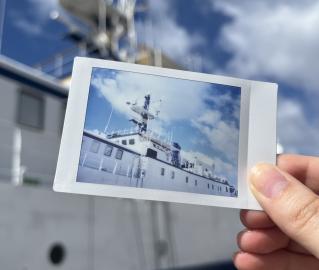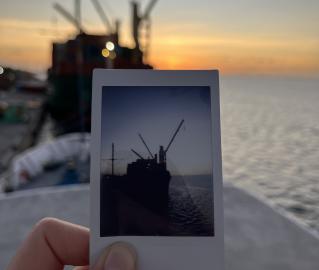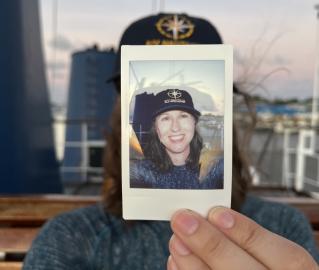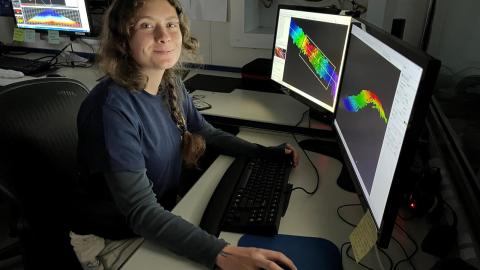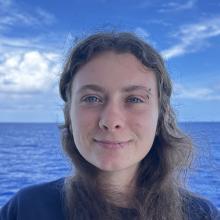
Ella Magrum-Stanley
Tell us about your work/research. What kinds of things do you do?
I have just recently graduated with my Undergraduate degree from Bangor University and am on a gap year to determine what I will pursue in a master's program. Over my time at University, I have had the opportunity to participate in data collection over different disciplines from dissection, core collection and surveying to taking Conductivity, temperature, and depth (CTD) measurements aboard research vessel. In my final year I worked on writing a dissertation to answer the question of: What causes glacial melting in the Arctic Fjords? I analyzed glacier retreat rates, as well as sea surface temperature and surface air temperature patterns layered on a seabed map of the arctic to understand the relationship with melting. I hope to, in the future, continue working with seabed mapping data and exploring the oceans to answer the hard pressing questions humanity has about our world.
What sparked your initial interest in your career?
As a child I was enthralled by the ocean and all of its wonders. Every vacation my family would take to the beach resulted in my wandering off to explore the tide pools or requesting a visit to a marine animal sanctuary. Eventually, I took a class in high school where I had the opportunity to better understand the fascinating creatures. This led me to begin exploring universities where I would have the opportunity to learn as much as I could about different ocean ecosystems. Ultimately, I decided to go to university in the United Kingdom to study oceanography with marine biology. This decision guided my interest towards the physical processes in the ocean and how we measure and contextualize them. In my first year I was assigned a self-guided research prompt where I explored seabed mapping through a literature review. I discovered that it was the basis of so many other disciplines and immediately developed a keen interest in learning how to map the seafloor and its further applications in marine science. There is so much more of our oceans to be explored and understood and exploration has always had a special place in my heart. Seabed mapping to uncover the mysteries of the deepest parts of our oceans quickly became my ideal career goal.
Who influenced you or encouraged you the most?
My moms have always been my biggest supporters regarding anything I've wanted to do, when I told them I wanted to study the ocean they went out and bought every deep ocean book they could find. On family vacations they would always make the time to take me to animal sanctuaries and aquariums where I could marvel at the diversity of organisms. I expressed an interest in scuba diving and the next thing I knew I was getting certified and diving in the most beautiful locations, none of this would have been possible without them.
What element of your work/study do you think is the most fascinating?
The most exciting element of working and studying marine science has to be going out on research collection cruises, there is so much to do and everyone on the vessel moves and works as a unit. I love witnessing and collecting samples firsthand and then analyzing that data in the lab because you get to see the scientific process through from the beginning, which is so interesting!
How did you get involved with the Ocean Exploration Trust?
I applied in 2023 and again in 2024, where I was accepted as a seabed mapping intern, for multiple different internships under SEIP. I had also been subscribed to the newsletter previously and enjoyed watching the livestreams which is how I discovered the internship opportunity.
What other jobs led you to your current career?
Up until now I have only ever worked in cafes and restaurants, however this was to save money to put towards anything ocean related such as scuba trips and gear. I have also worked shortly, as a research assistant at my university for the collection of sediment viscosity data. Rather than having jobs in the marine sector as I was still in university, I have gotten experience through school and through being a PADI certified open water diver. Moreover, I have worked on social media and website design and have developed networking skills which have led to amazing opportunities to further my career and academic goals.
What are your degrees and certifications?
Bachelor's in Marine biology with Oceanography-- University of Bangor 2025
What are your hobbies?
I enjoy hiking, as I have a national park just a bus ride away, I practice yoga, and I love to travel. In my spare time read Russian and Japanese literature, and attempt at learning new languages!
What advice would you give someone who wants to have a career like yours?
If you are looking to go into the field of marine science the first thing, I would tell you is to find a passion for it! This doesn't have to mean finding exactly what you want to make a career out of, but more of a broad passion for expanding your knowledge regarding marine science. I would also suggest studying abroad if you are presented with the opportunity, it will broaden your view of the world and provide new skills when it comes to scientific research and writing. Lastly, I would say be persistent! If you apply for an internship or a job and do not get it on the first try, then try again! I am a firm believer in what is meant for you will find you, so if you hold a passion for marine science be sure to pursue any opportunities presented to you.
Expeditions
Ella participated in the following Ocean Exploration Trust expeditions:
